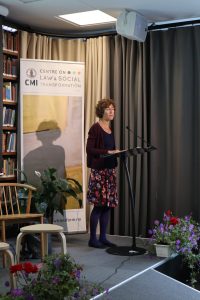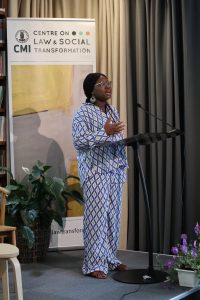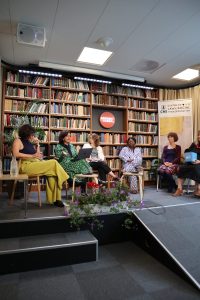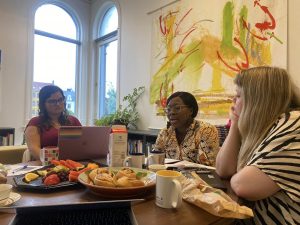Project Team: Siri Gloppen (PI), Adrian Jjuuko, Andrea Melberg, Clara Burbano Herrera, Frans Viljoen, Irene Maffi, Jayna Kothari, Juliana Cesario Alvim, Lise Rakner, Liv Tønnessen, Marta Machado, Ruth Rubio, Ole Frithjof Norheim, Satang Nabaneh and Yves Haeck
Timeframe: 02/01/2023 - 08/31/2024
Project Leader: Siri Gloppen
Funding: Worldwide Universities Network (WUN) RDF 2022, £10000
About the project
The project aims to to develop a collaborative, inter-disciplinary, and multi-sited research project investigating the growing politicization of gender across societies, and the consequences for public health and democracy. This addresses a major societal challenge and requires international collaboration. The politicization of gender is a profoundly ‘glocal’ phenomenon in that it has «simultaneous occurrence of both universalizing and particularizing tendencies” (Britannica) — in other words: developments in different parts of the world are interwoven, yet play out differently, with different effects in each context. To understand the driving forces and consequences, it is insufficient analyze local manifestations in isolation, we must also understand the ways in which local, transnational, and global dynamics are interlinked. This requires collaboration among scholars with deep contextual knowledge. Two types of consequences of the politicization of gender are emerging as particularly salient: the social implications in the domain of public health, and the political implications for democracy as politicization of “gender ideology” plays into autocratization processes. To understand these dynamics, we will examine a broad range of issues politicized as “gender ideology”, including sexual orientation, gender identity, abortion, sex education, domestic violence, access to contraception and ARTs/infertility treatment. We will analyze contexts that vary along different dimensions: region, religion; socio-economic development; and regime type. We will conduct desk research and preliminary analysis of seven case studies (South Africa, Uganda, Tunisia, Brazil, India, Norway and Spain) and convene a workshop to develop a joint research project. The WUN grant will position us to explore this topic with current and new partners and increase our chances of succeeding with grant proposals to national and international funding agencies.
Related public events in August 2023:
Keynote Reproductive justice and democracy by Irene Maffi (University of Lausanne, Switzerland) on 17 August at the Bergen Exchanges on Law & Social Transformation 2023. The concept of reproductive justice was introduced to challenge the abortion rights focus of the
debate on reproductive health and rights in the USA, a discourse dominated by white middle-class feminism. A reproductive justice focus broadens the debate to include other rights needed for women of color and poor and vulnerable people more broadly, to have children and be able to raise the m in good conditions. It takes into account the system of inequalities and structural violence in which specific categories of women are inscribed within the society and not only in health care facilities. It also contains larger ethical connotations that are absent from the notion of human rights that are more strictly related to international or national law. Reproductive injustice thus includes all structural inequalities limiting the access to health care and the possibility of making autonomous decisions in the domain of reproduction on the basis of class and gender but also marital status, sexual orientation, gender identity, age, citizenship, religion, etc. In this keynote Irene Maffi, will discuss the concept and some of its manifestations.
m in good conditions. It takes into account the system of inequalities and structural violence in which specific categories of women are inscribed within the society and not only in health care facilities. It also contains larger ethical connotations that are absent from the notion of human rights that are more strictly related to international or national law. Reproductive injustice thus includes all structural inequalities limiting the access to health care and the possibility of making autonomous decisions in the domain of reproduction on the basis of class and gender but also marital status, sexual orientation, gender identity, age, citizenship, religion, etc. In this keynote Irene Maffi, will discuss the concept and some of its manifestations.
Maffi’s keynote was followed by a roundtable & Book launch
Satang Nabaneh (University of Pretoria, South Africa, and University of Dayton, USA) presented her new book Choice and Conscience: Lessons from South Africa for a Global Debate. She drew on her work on conscientious objection in South Africa to illustrate how intersecting structural inequalities and shifting power relations influence access to abortion care. Her presentation served to start off the roundtable discussion with participants from different parts of the world offering their perspectives on reproductive (in)justice, with a particular focus on the implications for democracy.
Africa for a Global Debate. She drew on her work on conscientious objection in South Africa to illustrate how intersecting structural inequalities and shifting power relations influence access to abortion care. Her presentation served to start off the roundtable discussion with participants from different parts of the world offering their perspectives on reproductive (in)justice, with a particular focus on the implications for democracy.
Comments by Juliana Cesario Alvim, Federal (University of Minas Gerais, Brazil), Francisca Pou
Giménez (UNAM, Mexico), and Andrea Melberg (University of Bergen). Moderator: Liv Tønnessen (CMI/LawTransform)
Roundtable: Sex education – gender at the illiberal frontier on 17 August at the Bergen Exchanges on Law & Social Transformation 2023.
Contestations over comprehensive sex education currently plays out in myriad domestic and
international arenas across the globe, with particularly heated discussion concerning whether,
when and how children should learn about different sexual orientations, gender identities and
expressions, abortion and contraception. This seems to be a ‘glocal’ phenomenon in that
developments in different parts of the world are interwoven, yet play out differently, with different effects in each context. So while the developments in different countries and regions of the world are interlinked, they manifest in distinct ways in each context with different social and political consequences. This roundtable will discuss how local dynamics are interwoven at transnationa l level in ways that (re)shape this global phenomenon; how global driving forces combine with diverse local cultures, gender norms, and power-structures to shape the form and force of gender politicization in specific contexts, and what the consequences of the politicization are in different localities, with regard to public health and democratic processes.
l level in ways that (re)shape this global phenomenon; how global driving forces combine with diverse local cultures, gender norms, and power-structures to shape the form and force of gender politicization in specific contexts, and what the consequences of the politicization are in different localities, with regard to public health and democratic processes.
Participants: Juliana Cesario Alvim (Federal University of Minas Gerais, Brazil); Lívia Buzolin (FGV,
Brazil); Ana Côrtes (University of Bergen/LawTransform/University of Coimbra,Portugal); Bela
Hümmelgen (Central European University, Austria). Moderator: Satang Nabaneh (University of
Pretoria and University of Dayton, USA).
Project workshop in August 2023:
Related public events in 2024:
Keynote Speech Gendered Politics and Autocratization in Africa delivered by Satang Nabaneh as a part of the UiB 2-day conference-format PhD course on Gendered Autocratization which was hosted by LawTransform at Bergen Global in March.
Roundtable Migration, health and reproductive justice on 20 August at the Bergen Exchanges on Law & Social Transformation 2024. Migrants experience multiple barriers in accessing health services, including for sexual and reproductive health. This is critical given that refugees and other migrants, due to their circumstances often have greater health service needs, both on the move and once they settle. Lack of access to services causes serious violations of their human right to health. The panel discusses the multifaceted health challenges of migrants and strategies for addressing them, including the potential of law. Participants: Irene Maffi University of Lausanne, Camila Gianella PUC Lima, Ayan Bashir Sheikh-Mohamed University of Bergen (digital), Candela Arias Perez University of Washington. Moderator: Carmeliza Rosario CMI.
Related publications in 2024:
Ana de Mello Côrtes’ (2024) blogpost on “Governing Assisted Reproduction”:
Satang Nabaneh’s (2024) blogpost on “Gender Trouble: Glocalization of Sexuality Education”:
Blogpost: Gender Trouble: Glocalization of Sexuality Education

